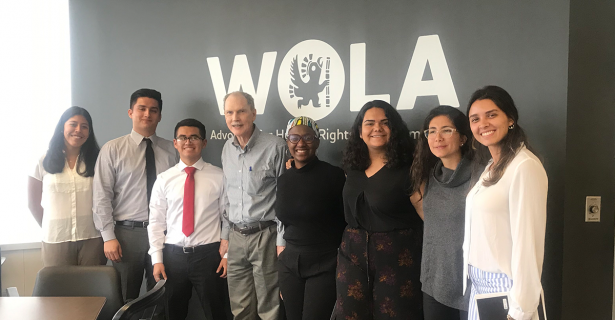I start out my day at 7am: wake up, eat breakfast, get ready, and walk to the bus stop at Park Rd and 19th St to take the red line from Cleveland Park to Dupont Circle. I walk four minutes and I reach 1666 Connecticut Ave, the home of the Washington Office on Latin America (WOLA).
WOLA was founded in 1974, following Chile’s 1973 military coup against Salvador Allende. Joe Eldridge, who I met during one of our weekly brown bags, started WOLA with the support of other church leaders in an effort to connect policy makers in Washington with people in the field in Latin America who had first-hand accounts of crimes against humanity, state repression, and torture. From tackling dictatorships in the 1970s to Central American conflicts in the 1980s and aiding democratization efforts in the region in the 1990s, WOLA has been at the forefront of human rights advocacy in Latin America. Today, its focus has shifted to current issues, such as corruption in Central America, Venezuelan and Colombian transitional justice, and Mexican corruption and migration policies, among a number of other challenging and relevant programs.
This summer, I am working as the intern for the Mexico and Migration program under Maureen Meyer and Gina Hinojosa. They have written reports on violence against human rights activists and journalists, corruption integral part in the Mexican system of governance, and Mexico’s historical migration policies. Both are extremely knowledgeable about Mexico; John Oliver receives his information about Mexico from Maureen whenever he includes it in his HBO series.
At the moment, I am working on a research project specifically focused on Mexico’s efforts to contain migration at its southern border. Since April 2019, Mexico has increased its crackdown on migration following the increased influx of Central American migrants after Mexico made humanitarian visas available. The US has played an important role in pressuring Mexican President Andres Manuel Lopez Obrador, or as most call him “AMLO,” to tackle migration at Mexico’s southern border in order to reduce the number of migrants at its border with the US.
Conditions at both borders are beyond inadequate. On June 5, there were an estimated 19,000 people in custody at the US-Mexico border, even though the facilities have a capacity of maximum of 5,000. With increased control of the borders and recent threats of tariffs, the US has effectively cornered Mexico, forcing it to crackdown even though this goes against AMLO’s political platform. Right now, Mexico has deported over 80,000 migrants and has deployed over 6,000 agents to its southern border to appease the US administration.
As a student double majoring in International Relations and Latin American Studies and minoring in Political Science, interning at WOLA has proven ideal. I research about migration, relations between the US, Mexico and Central America, Mexico’s historical corruption and clientelism in its states, and barriers to democratic governance. In addition to researching, I have also had the chance to attend a series of conferences and events, including an event hosted by Notre Dame’s Kroc Institute for International Peace Studies on Colombia’s Peace Process two years after the signing of the agreement and an event about Cuba’s designer Clandestina. I also plan to attend the Newseum’s Turned Away event, the Hearing of the Senate Appropriations Committee on Full Committee Markup of the Emergency Border Supplemental, among others. I look forward to continuing to learn more about Mexico and migration, especially in the current political environment.

